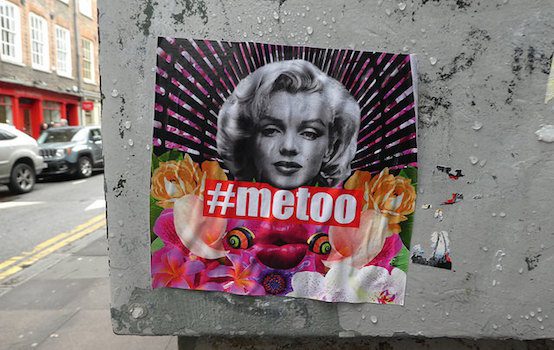#MeToo Hops the Pond

In Britain, we always seem desperate to fight the latest American culture war. So when the New Yorker revealed Harvey Weinstein’s predations, we immediately started scrambling around for Weinsteins of our own. We would prefer not to miss out on any of the clashes happening across the Atlantic. And #MeToo is nothing if not an inclusive battle cry.
As in the U.S., the latest squabble here is between men and women—or as someone suggested to me after I wrote about this for The Spectator, “predators and victims.” It seems mad, but it is fast becoming heretical to state that you do not think most women are victims and most men are predators. To say so is to leave oneself open to accusations of either childlike ignorance or willful callousness.
Under the banner of #MeToo, rapes were reported. Jobs were lost. Stories about knees being brushed were splashed across the front pages of our national newspapers. In Wales, a politician killed himself after he was accused of sexual harassment. That didn’t give any of the accusers much pause. Indeed, one progressive contemporary of mine, upon hearing of the suicide, said glibly, “well he wouldn’t have done it if he hadn’t done something wrong.” She seemed to think justice had been served.
The commercial world has been quick to cash in on the gender wars. Woke young things can buy protest clothes from high-street shops. Popular slogans are “Girls do it better,” “Females unite,” and “Don’t underestimate the power of a woman.” On Amazon, you can buy a T-shirt that says “Me Too.” If you look at pictures of protests against President Trump, you notice women wearing similar items, in an almost identical palette of Millennial pink and white. The global resistance must look pretty for Instagram.
How did our liberal world come to this, with men and women being encouraged to be suspicious of each other? In Britain, we try to be proud of our country’s cultural soup. We like to believe that different creeds and cultures mostly get on quite well, even if that clearly isn’t always the case. Yet we have also decided that the world can be broken down along the most basic of lines: she versus he.
Much as I love America, I resent this imported antagonism in Britain, this sense that you must pick one side or another. It feels unnatural. Our political system isn’t prepared for such toxic divides. The British work better in shades of grey, with the positions of “I’m not sure,” and “Do I really have to pick a side?”, leaving politics to the privacy of the ballot box, rather than plastering views everywhere for all to see.
Take Brexit, our home-grown cultural clash that we certainly weren’t prepared for. The Tories are at loggerheads because half of them think leaving the European Union is a terrific idea and the other half don’t. The same is true of Labour. Voters have polarized along the lines of Remain versus Leave—and neither political party knows how to cope with this new sectarianism.
Most people I know didn’t even really care about the EU before the referendum. But nowadays it is rare to attend a dinner party at which Brexit doesn’t come up. Are you In or Out? I miss the days when we didn’t constantly have to discuss billion-pound divorce bills, chlorinated chicken from the U.S., or the character of Michael Barnier, the EU’s chief negotiator. Brexit has turned us into a nation of bores.
Some of the other cultural ideologies Britain has imported seemed alien at first. But those phrases beloved by both American and British students—”safe space,” “no platform,” and “trigger warning”—have melted into our lexicon (as have the concepts of Black Friday and Cyber Monday, which really do seem nonsensical in a British context). This new dialect is now being used to argue for the separation of the sexes. There is chatter about the possibility of “women-only carriages” on trains. Modesty wear is becoming more popular on the catwalks. In February, more than 40 designers contributed to the first “London modest fashion week.” Consent classes—another student lark, we thought—are being rolled out across a range of industries. In the military, officers have been advised that they should ask for a woman to give them consent, filmed on their phone, before taking things further.
The #MeToo trend—anything with a hashtag is always a trend, not a movement—already feels passé. This is the way with fashionable ideas that blow through social media. The winds—or algorithms—change and something else becomes more interesting. I do not doubt that for many women #MeToo has been a balm with which to soothe past traumas. But the lasting outcome may well be that we have sacrificed hard-won freedoms in order to protect women—dear little things that we are—and keep up with this latest culture war. And what next? Wherever America goes, you can be sure that Britain will follow. We always want to join in.
Lara Prendergast is online editor for The Spectator.
Comments